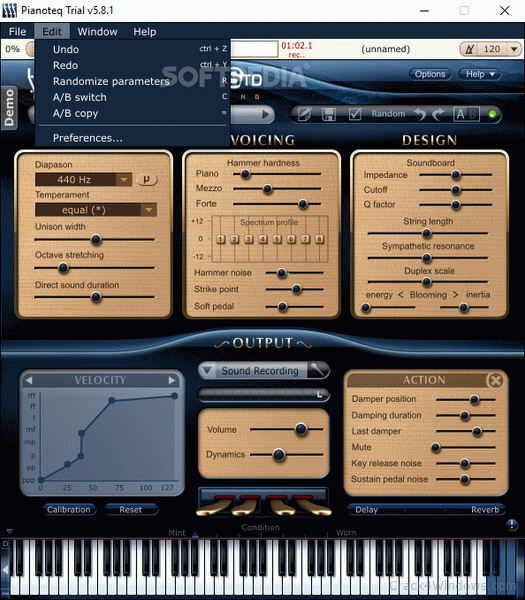

Below are some selections of instrument packages.Extended key range (105 keys = 8 + 2/3 octaves) for Steinway D and K grand pianos.Extremely small file size (less than 50MB).Generates high-resolution MIDI CC # 88 and Lavoisier X formats.No quantization noise (32-bit internal calculation).Effects: Tremolo, Ah, Chorus, Clanger, Chaser, Fuzz, Delay, Amp, Compressor, Mini-e.Progressive sustain pedal, allowing partial pedal effects.Ostentation, Rattle, Buff Stop, Celeste, Pinch Harmonic, Glissando.Ten types of pedals (can be assigned to all four pedals II): Sustain, Soft, Harmonic, Ostentation, Super.The integrated graphical curve for key velocity, note off, and pedal.Adjustable mechanical noise (sampled or modeled).Realistic sympathetic resonances including duplex scaling.Polyphonic aftertouch (particularly interesting for the harpsichord).Gradual variation in timbre (uses all 127 MIDI velocities).Adjustable unique physical parameters such as unison width, octave stretch, hammer hardness, resonance box, string length, sympathetic resonance, duplex scale resonance.Free Instruments: Collection of historical Kirov instruments, bells, and bells.Optional instruments for sale: uprights, grand pianos, rock piano, electric pianos, harp, vibraphones, clarinet, celesta + glockenspiel, xylophone + marimba, steel pans.Pianoteq is a physically modeled virtual instrument.

The standalone version now offers a MIDI playlist, enhanced MIDI file, and the ability to export audio to FLAX and MP formats, in addition to AV. It includes chord identification and the tuning section has become even more advanced with new tools. It eases your workflow by adding support for VEST format and ARM architecture (Linux version only, for example on Raspberry Pi 3 boards). A lot of help is provided and the utility does not affect the presentation of your PC. Virtually all activities have an alternate console path, but you should understand that they depend on the change.


 0 kommentar(er)
0 kommentar(er)
